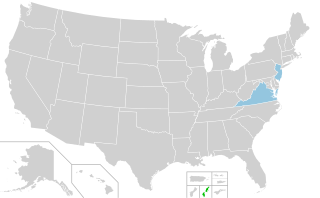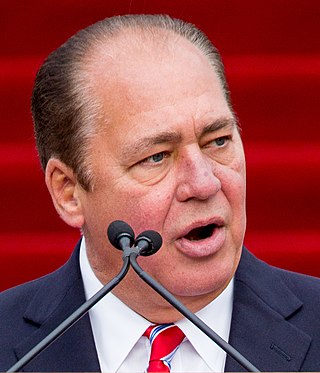
The governor of New Jersey is the head of government of the U.S. state of New Jersey. The office of governor is an elected position with a four-year term. There is a two consecutive term term limit, with no limitation on non-consecutive terms. The official residence of the governor is Drumthwacket, a mansion located in Princeton, New Jersey. The governor's office is located inside of the New Jersey State House in Trenton, making New Jersey notable as the executive's office is located in the same building as the legislature. New Jersey is also notable for being one of the few states in which the governor's official residence is not located in the state capital.

Richard James Codey is an American politician who served as the 53rd governor of New Jersey from 2004 to 2006. A member of the Democratic Party, he served in the New Jersey Senate from 1982 to 2024 and as the President of the Senate from 2002 to 2010. He represented the 27th Legislative District, which covered the western portions of Essex County and the southeastern portion of Morris County.

The Lieutenant Governor and Speaker of the Senate of Tennessee is the presiding officer of the Tennessee Senate and first in line in the succession to the office of governor of Tennessee in the event of the death, resignation, or removal from office through impeachment and conviction of the governor of Tennessee.

John J. Farmer Jr. is an American author, lawyer, politician, and jurist. He is the director of the Eagleton Institute of Politics, where he also leads the Miller Center for Community Protection and Resilience (CPR). He served as acting governor of New Jersey for 90 minutes on January 8, 2002, by virtue of his status as New Jersey Attorney General.

The New Jersey Senate is the upper house of the New Jersey Legislature by the Constitution of 1844, replacing the Legislative Council. There are 40 legislative districts, representing districts with an average population of 232,225. Each district has one senator and two members of the New Jersey General Assembly, the lower house of the legislature. Prior to the election in which they are chosen, senators must be a minimum of 30 years old and a resident of the state for four years to be eligible to serve in office.

United States gubernatorial elections were held on November 8, 2005, in the states of New Jersey and Virginia as well as in the U.S. commonwealth of the Northern Mariana Islands.

The 2005 New Jersey gubernatorial election was a race to determine the governor of New Jersey. It was held on November 8, 2005. Democratic governor Richard Codey, who replaced Governor Jim McGreevey in 2004 after his resignation, did not run for election for a full term of office.

New Jersey in the 21st century has been deeply affected by terrorism and political controversy.

The lieutenant governor of New Jersey is an elected constitutional officer in the executive branch of the state government of New Jersey in the United States. The lieutenant governor is the second highest-ranking official in the state government and is elected concurrently on a ticket with the governor for a four-year term. The position itself does not carry any powers or duties other than to be next in the order of succession, but the state constitution requires that the lieutenant governor also be appointed to serve as the head of a cabinet-level department or administrative agency within the governor's administration, other than the position of Attorney General.

Earl Ray Tomblin is an American politician who served as the 35th governor of West Virginia from 2011 to 2017. A member of the Democratic Party, he previously served in the West Virginia Senate from 1980 to 2011 and as president of the West Virginia Senate from 1995 to 2011. Tomblin became acting governor in November 2010 following Joe Manchin's election to the U.S. Senate. He won a special election in October 2011 to fill the unexpired term ending on January 14, 2013, and was elected to a full term as governor in November 2012.

The lieutenant governor of Oklahoma is the second-highest executive official of the state government of Oklahoma. As first in the gubernatorial line of succession, the lieutenant governor becomes the new governor of Oklahoma upon the death, resignation, or removal of the governor. The lieutenant governor also serves as the president of the Oklahoma Senate, and may cast a vote to break ties in that chamber.
Regena Thomas is the former Secretary of State of New Jersey and a political consultant. She served in the cabinets of former Gov. James McGreevey and former Gov. Richard Codey.

The president of the West Virginia Senate is a member of the West Virginia Senate who has been elected to be its president by the other senators. The current Senate president is Craig Blair, who has been in office since January 2021.

The lieutenant governor of Indiana is a constitutional office in the US state of Indiana. Republican Suzanne Crouch, who assumed office January 9, 2017, is the incumbent. The office holder's constitutional roles are to serve as the president of the Indiana Senate, become acting governor during the incapacity of the governor, and become governor should the incumbent governor resign, die in office, or be impeached and removed from office. Lieutenant governors have succeeded ten governors following their deaths or resignations. The lieutenant governor holds statutory positions, serving as the head of the state agricultural and rural affairs bureaus, and as the chairman of several state committees.
The following table indicates the party of elected officials in the U.S. state of New Jersey:

The 2011 United States elections were held on Tuesday, November 8. This was an off-year election, in which the only seats up for election in the United States Congress were special elections. There were also four gubernatorial races, including a special election in West Virginia. There were also state legislative elections in four states and judicial elections in three states; as well as numerous citizen initiatives, mayoral races, and a variety of other local offices on the ballot.

A lieutenant governor is an official in state governments of 45 out of 50 of the United States. In most cases, the lieutenant governor is the highest officer of state after the governor, standing in for that officer when they are absent from the state or temporarily incapacitated. In the event a governor dies, resigns or is removed from office, the lieutenant governor typically becomes governor.

United States gubernatorial elections were held in four states in October and November 2011, with regularly scheduled elections in Kentucky, Mississippi, and Louisiana; and a special election in West Virginia. None of these four governorships changed party hands, with Democratic incumbents Steve Beshear and Earl Ray Tomblin winning in Kentucky and West Virginia, respectively; and Republicans re-electing Bobby Jindal in Louisiana and holding the open seat in Mississippi.















